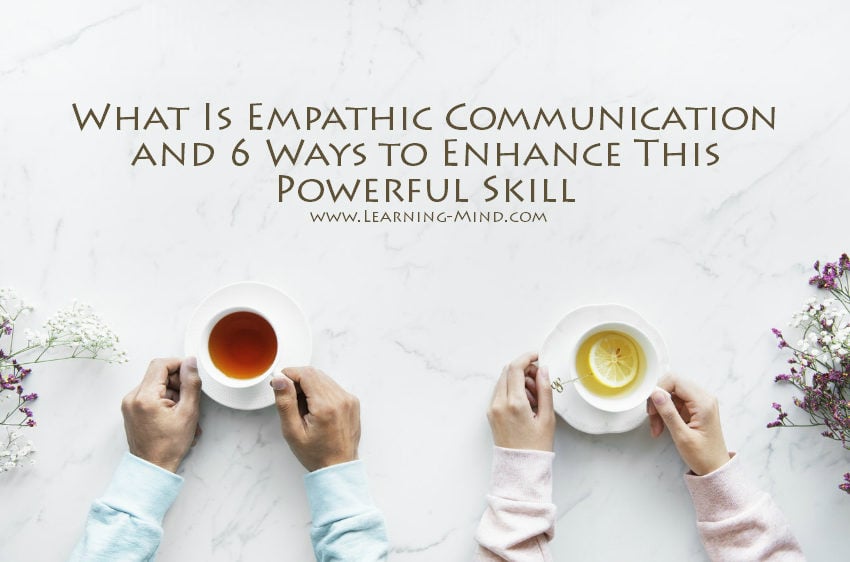
Although we communicate on a daily basis (either face to face or on social media) and we strive to do it the best we can, we feel we have not been heard or understood as much as we would have expected. That usually happens when there is a lack of empathy or interest from the people we talk to. This is where the concept of empathic communication comes into play.
Stephen Covey, the author of the book “The 7 Habits of Efficient People”, defines empathic communication as follows:
“When I speak of empathic listening, I want to define a way of listening with the intent to understand. First, listen to really understand. Empathic listening enters the interlocutor’s frame of reference. Look at the ins, look at the world as he sees it, understand the paradigm, understand what he feels.
In essence, empathic listening does not imply an approving attitude on your part; it means having the fullest understanding, as deep as possible at the intellectual and emotional level of your interlocutor.
Empathetic listening involves much more than recording, reflecting, or even understanding the words spoken. Communication experts say that in reality, only 10 percent of our communication is done through words. Another 30 percent are sounds and 60 percent body language.
When listening emphatically, listen with your ears, but actually listen with your eyes and heart. Listen and perceive feelings, meanings. Listen to Behavioral Language. You will also use the right and left brain hemispheres. Empathic listening is an enormous deposit into the Affective Account, has a therapeutic and healing effect.”
Thus, empathic communication, in the simplest definition, means showing the other person that s/he is listened to and that their inner universe (thoughts, emotions, attitudes, values, etc.) is being understood.
Entering into the world of other people and seeing what they see is not something easy, but it helps us avoid making the wrong assumption and misjudgments about the person we talk to.
Communicating without the proper, correct perception of the meaning of the message, leads to a decrease in the empathic character of the relationship or conversation.
“We are naturally inclined to want the opposite: we want be understood first. Many do not even listen with the intent to understand; they listen with the intent to reply. They either speak, or they are ready to speak.
Our conversations become collective monologues. We never really understand what is happening inside another human being.”
-Stephen Covey
No wonder why the cause of 90% of conflicts has to do with faulty communication. That is because when someone talks, we usually choose a level of listening out of three:
After listening to someone talking, we usually have one of the following four reactions:
Empathy helps you not to be afraid of strangers. If you do not want to live a lonely life and feel like everyone is against you, then you need to work on your empathic communication skills.
Empathy helps you understand that every person has a lot in common with you and we are largely following the same goals. It reminds you that we are genetically programmed to care for one another and to help others.
We are indoctrinated by the media and society that all Muslims are terrorists, that Jews lead the world, and so on.
All this hatred and fear dissolves when we give a chance to the person in front of us to tell their story, look at their experiences through their eyes and understand the reasons for doing what they do.
By connecting to other people, understanding their needs, experiences and goals, we become more receptive to the factors that can benefit or hinder their development.
Thus, we start developing altruistic and compassionate behaviours and as such, we are more aware of the consequences of our actions.
As a matter of fact, a recent survey related to the reduction of global warming revealed that “tapping into our tendency toward compassion for others was a more effective motivator than appealing to self-interest.”
If you are already using the skill of empathic communication, did it help you in your personal and professional life? Please share your experiences with us in the comments below.
References:
View Comments
Interesting blog as always. One of the things I sometimes find myself doing is thinking about my "clever, insightful" response and thereby missing a part of what the other person is saying. Many years ago I volunteered for an organization called "The Centre for Living with Dying. This organization was a grief counselling center for people who had sustained the loss of a family member or who had a terminal illness. As a part of our training we were told to listen with "big ears". in other words let the other person speak without interrupting them and above all don't, as I said earlier, miss what they are sharing because you are distracted by your own thoughts. When you are having a conversation with another person, let them speak. In a group conversation this is even more difficult.
I enjoyed the blog thank you . I find myself interrupting and not getting the picture. It is so easy to conclude other person's ideas. Now I know what to do to listen to my other senses when really trying find out the root of the problem. I really enjoyed this.